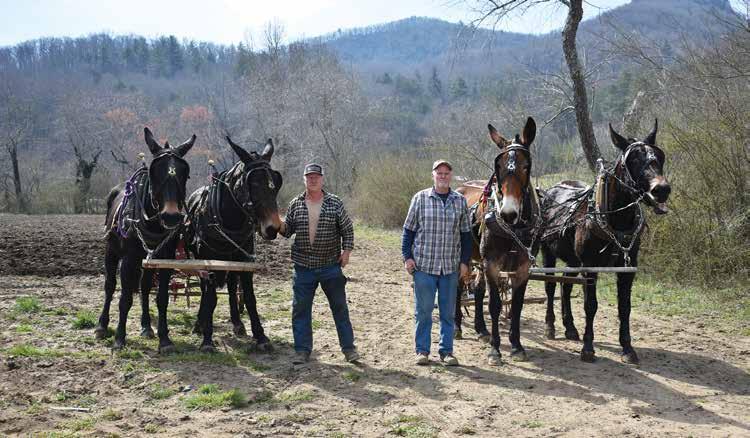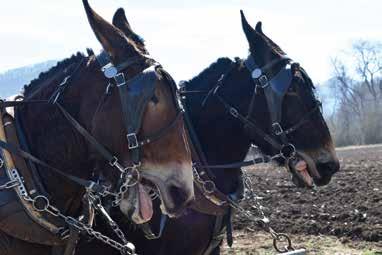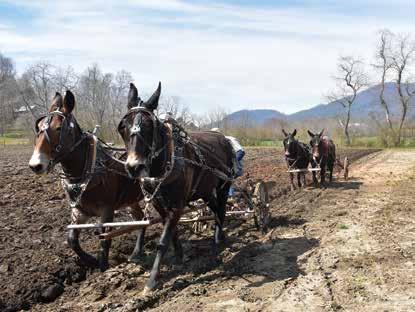
5 minute read
A Salute to the Vanishing Mule
These Brothers Gee-Haw
by Tracy McCoy
Edgar James was born and raised in Scaly Mountain, North Carolina. Farming was a way of life for the James family. When Edgar’s boy Bob was born, pretty soon after or as soon as he could walk good, he was out in the fields following behind his dad. There were no tractors or big harrows or planters so everything fell on the mule. A man and a team of mules could go many miles a day. They usually stopped at noon when they heard the farm bell and returned to the farm house where the mules drank a lot of water and ate some corn and rested a while. The farmer ate dinner and usually laid down in a cool spot on the porch to rest a while. After dinner it was the same thing all over again until darkness for a day of about 14 or so hours. Back to the house, feed and water again, and be ready for morning.
When Bob was grown and had his own kids (Lynn, Dale, Sandra and Neal), he took them to the fields and taught them to work growing crops. A good set of mules was a requirement for plowing and cultivating crops. There was always a good pair of broke mules in the James boys farm. Bob also had two strong boys to help him work the fields. Dale and Neal James learned to train the team (pair of mules) and how to work them once they were well trained. “You gotta fool with them from the day they are born. Just like your dog, you gotta spend time with them and work with them. When one gets about a year old you can start putting the harness on them to get em’ used to it. Then when they get a couple years old you can hook them to something and let them start learning,” Neal told me when we spoke for this article. I actually met Neal and his brother Dale in Rabun Gap while they were plowing with Neal’s team Mattie and Mandy and Dale’s team
Rhoda and Ada. I learned more in 15 minutes than I’ve known my whole life about plowing with mules.
Dale is a soft spoken man and he talked to Rhoda and Ada in that fashion. As he continued talking to them they made their way down the row, circled and came back. When two mules are working together one is always walking in the furrow meaning the row they just made. That mule has it a little harder but the next time it’ll be the other one in the furrow. Kinda like life I


guess. The mules do as they are told and that comes from good training. So to get the mule moving you would say giddup and gee means right and haw means left and Neal says the most important command is Whoa! “A mule that is green, or not well trained can get spooked or excited and take off with you. I don’t want a ‘runaway mule’. If you get one that runs you’ll never get them trained and they can get you killed.” I asked who first came up with gee and haw and Neal said, “I don’t know but I’ve heard it from the day I got here.” Neal’s lead mule is Mattie. Mandy listens to what he tells Mattie to do and does it too.

Neal and Dale plow up the ground to plant with their teams and then use them to cultivate the field. Sometimes they use a riding plow and sometimes a walking plow. Then there is a hillside turner. Plows can be made to throw dirt right or left or both. The plow they used the day I took photos was borrowed from David Hopper. The field was getting ready for cabbage, tomatoes, beans, and bell pepper. These brothers plant fields on Betty’s Creek, up in Scaly Mountain and in Otto. Running a team all day in the field is hard on the farmer and the team. I asked the obvious question, why? Why do it this way, it would be so much easier with a tractor, like the one parked on the side of the field. “Lack of sense, I guess,” Neal said laughing. “Heritage, it’s about heritage. It’s how we learned and we like preserving that tradition.”
The brothers have sisters who worked in the fields too. They didn’t plow but they worked just as hard. I was told that Sandra was the fastest cabbage cutter in the family and Lynn was a close second. “We were taught that to have anything you had to work for it,” Neal said. He said he was taught if a mule was sweating, he is minding. “The mules are glad to get to the barn at the end of the day. We wipe em’ down, water and feed them and they stand still till morning,” Neal told me. I think he and Dale likely do something similar. Maybe a shower, a plate of beans and taters with a slice of onion and cornbread washed down with a glass of sweet tea. The bed feels pretty good after a day in the field and you close your eyes knowing that tomorrow is more of the same. Farming has been the James brothers life and they are not ready to stop now. As long as Mattie, Mandy, Rhoda and Ada can pull the plow they’ll be riding.
Neal and his mules sometimes find a little time to enjoy life. “I like to ride or go on the wagon train with Randy Teague, Dank James and Carl Chlupacek.” Randy owns Randy’s Horse Camp on Warwoman Road. Word is, they let mules in too. Another one that rides with Neal is his granddaughter Lyla. She is the apple of his eye and she looks pretty comfortable with the mules. Thanks to Neal and Dale for allowing me to come watch them plow and for talking with me.











